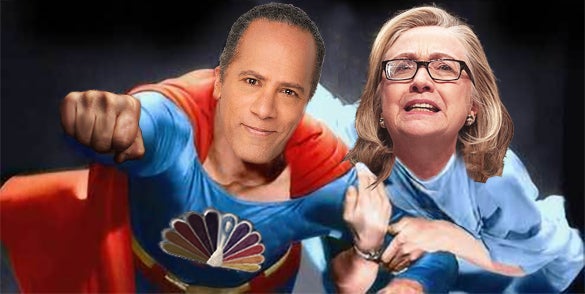RUSH: Michael in Cleveland’s been waiting for quite a while, and I appreciate it. It’s great to have you on the program, sir. Hi.
CALLER: Hey, Rush, thanks for taking my call. I just wanted to make a brief point. Earlier in the program you mentioned that a lot of Trump supporters, you know, maybe knew a lot of what he was talking about when he was missing the low-hanging fastballs and that half of Hillary’s supporters probably even knew that. My question is, or my point is that I think he did miss a golden opportunity because, by that analysis, half of Hillary supporters don’t know these things about the Clinton Foundation, about the emails, about Benghazi, and I think that’s sort of maybe what upset some people that support him. Not so much that, you know, he didn’t say what we know, but with a hundred million people watching, you know, maybe, you know, 20 million don’t know some of these —
RUSH: Ah, that’s a good point.

RUSH: That’s a good point. That is a good point. It was an opportunity to inform others who may not know because all they read is the Drive-Bys and the Drive-Bys cover this stuff up.
CALLER: Exactly. So I think that’s why some people on our side were going, “Gosh, you know, you missed, you missed, you missed.” And it wasn’t that, you know, we wanted to hear him preach to the choir, but, you know, a golden opportunity with all those eyeballs on that debate last night.
RUSH: So you were one of the ones that was disappointed. Do you think he hurt himself at all by this?
CALLER: I don’t think he hurt himself. I agree with you on the fact that he’s talking to the people, and, you know, we want him to fight even more. As someone that’s a supporter I’m on the fence with him a little bit, but I don’t think he hurt himself. But I do think he missed some opportunities to get some of the moderate people on board to draw attention to some of these items that, like you said —
RUSH: Yeah, that’s a good point.
CALLER: — they were just low hanging fastballs.
RUSH: Whether they’re moderates or wackos, it doesn’t matter. That’s an excellent point, that by not mentioning it, he missed the chance to educate and force others to be talk about it, force her to talk about it.
CALLER: Exactly.
RUSH: Well, look, there are two more debates. And one thing I saw, I saw a Trump tweet after the debate. It wasn’t a complaint. He was noting that there were no questions on Benghazi, there were no questions on the emails, and there was no questions on the Clinton Foundation. And I have to say, I looked at that and said, “Donald, doesn’t matter. That’s why you’re there. If Lester doesn’t bring ’em up, bring ’em up yourself. You can answer any question Lester asks you with anything you want to say. Lester could ask you about race relations and you could launch into the foundation.”

Folks, we’re overlooking something here, or maybe not giving it enough weight. This was a big deal last night for Trump. I’m not making any excuses here by any stretch. Don’t anybody misunderstand me here. I’ve done radio all my life. The first time I did television, I was petrified. I was so self-conscious, ’cause I wasn’t experienced at it. It’s a whole different thing than radio, where I have literally no nervousness, qualms, self-consciousness. On TV it’s all different.
I was talking about Arnold Palmer yesterday. I met Arnold Palmer at the Bob Hope Chrysler Classic. Bob Hope was still alive. It was the last year that Bob Hope actually attended the tournament, and I was paired with Arnold Palmer on day one. And my partners were Tom Glavine of the Atlanta Braves and Chris Chandler of the Atlanta Falcons. I don’t play golf for a living, but I’ve got this giant television audience, I’m in Arnold Palmer’s foursome meeting him for the first time. I am nervous as I can be.
On the first tee I’m just praying — it was over water — I was just praying, I don’t care what it looks like, just don’t let me hit this in the water. I end up birdieing the hole with like a 50-foot putt, and Arnold Palmer says, “I’m impressed.” And I said, “Mr. Palmer, I am so nervous, I can’t begin to tell you.” And I think Trump last night — I’m not saying he was nervous, don’t misunderstand. I’m saying he did something last night that hasn’t been done in our lifetime, somebody that’s not in politics do something like that against somebody, whoever it is, who has made a lifetime of it.
And I wouldn’t be surprised if Trump were a little self-conscious last night, and when you’re self-conscious, you’re not focused. When you’re thinking about yourself, however, for whatever reason, and that might be one of the low-hanging fruit. If it doesn’t occur to you naturally and you get distracted trying to remember when or what you should say — Look, folks, I leave this program every day, I go home beating myself practically every day up for failing to get something in that I really wanted to talk about. It’s not that I forgot it; I just didn’t budget my time well. I always think I could have done this better. I’m sure Trump is the same way. But the next time he does this he’s gonna be better, because he’s gonna have some experience at having done it under his belt.
BREAK TRANSCRIPT
RUSH: Trump got beat up for this last night, for having the sniffles. He didn’t have the sniffles last night. Because I am a highly trained broadcast specialist who understands the technology here. That’s how Trump was breathing. They have positioned the mic — I don’t know — not charging anything here, but his mic was positioned in such a way that you were able to hear him inhale.
He was breathing through his nose because it’s more polite to do that than to open your mouth wide and then breathe. And you can hear when people do that, too. If you listen to radio — a broadcast professional knows when to breathe and how to breathe and you can hear it. It’s like stage spit. Do you know what stage spit is? Stage spit is the sign of a highly professional live performer. I first bore witness to this, interestingly enough, when I was attending the Super Bowl in San Diego.
It was the Super Bowl about the Broncos and the Redskins where the Redskins just wiped ’em out. Doug Williams was the quarterback for the Redskins and Timmy Smith, the unheard of running back, had 135 yards or whatever. The Broncos scored first. This is the episode I had my first flyover. Sitting in the end zone, the planes coming out, I went bonkers when I saw it. The night before there was a concert, Frank Sinatra and Liza Minnelli, and Liza Minnelli was spitting all over the place. And I said, “What the hell is this?” I was positioned, the lighting, where I could see it.
And I talked to somebody and they said, “Oh, that’s stage spit. That means she’s really doing well.” It has to do with projection and voice control and you have to get rid of the saliva in your mouth. And you can’t spit when you’re performing, you have to find a way to get rid of it as you’re singing, and it comes out — it’s the same thing with breathing. You will hear on an audio-only commercial when you listen to radio, you’ll hear somebody go “uhh” real quick, take a real deep breath in the middle of it. And if they have compression on you’ll hear that really pumped up and sound as loud as somebody’s voice is what compression does.
Trump last night was breathing through his nose which of course is gonna sound like a sniffle. (interruption) Yes, I did stage spit all the time in the Rush to Excellence tour. You have to know how to do that. You have to be able to, shall we say, project the saliva. You can’t sit there and swallow all night in the middle of a performance. Sinatra was stage spitting, too. It’s not glaring. I mean, it’s not actually spitting. The saliva comes out of your mouth as you’re singing.
And it’s the same thing with what Trump was doing last night inhaling. He was inhaling through his nose and you could just hearing it like you can hear it when I do it there. (interruption) What did Howard Dean say? Hm-hm. Are you kidding? Are you kidding? Howard Dean speculated that Trump might be blowing coke? You ever wonder why you didn’t hear Hillary breathe? What are you gonna say, ’cause she’s a reptile and doesn’t breathe through her mouth? What are you gonna say? No, no, no. You didn’t hear her breathe, did you? Wonder why. Wonder why.
 Well, in many cases you don’t hear anybody breathe at these debates. But you can do amazing things with microphones and compression. I happen to love compression. Now, it’s amazing, I talk some audiologists about my implants. When I say compression, they think that I’m talking about compressing data to make it smaller. I’m not talking about that. I’m talking about compression of the dynamic range. And it goes back to the old AM radio days. You know, if you want to hear what compression is, there’s really no way you can do it now.
Well, in many cases you don’t hear anybody breathe at these debates. But you can do amazing things with microphones and compression. I happen to love compression. Now, it’s amazing, I talk some audiologists about my implants. When I say compression, they think that I’m talking about compressing data to make it smaller. I’m not talking about that. I’m talking about compression of the dynamic range. And it goes back to the old AM radio days. You know, if you want to hear what compression is, there’s really no way you can do it now.
But back in the sixties and seventies when Motown and the top 40 hits were what they were, they were pressed with compression. The stations added it, because so many convertibles driving around with all this noise you had to be able to hear the radio station. Compression adds volume. And it does it by every element of a song is the same volume. If you hear Sundown by Gordon Lightfoot there’s a beginning guitar riff not compressed, you hear it, but it’s not there. But when you hear it compressed, it’s as loud as his voice when he is singing. I happen to love it.
I wish there were ways I could demo it here but I can’t because we’re on AM stations and they compress their signal much more than FM does. The FM guys don’t do it ’cause those are audio files and they claim compression is nothing more than distortion and they’re not gonna muddy up their precious signal on FM with distortion. Well, believe me, it’s something if you never know exists you’re not even gonna know it until you listen to a song, you listen to I Can’t Help Myself by The Four Tops, back in 1965. You listen to it on the radio back then and then go buy the album and listen to it at home or on iTunes and it’s gonna sound totally different because the version you buy, there’s no compression. They don’t add it at the studio level, and it sounds like a whole different song to you.
I happen to love compression. Well, you can compress. If they wanted to last night, they could compress Trump’s mic. I don’t know that they did. But what happens when you do it, any little noise the microphone picks up is made to sound as loud as his voice. The compressor here right in this drawer, right to my left, I have compression running on my audio feed just because I like to hear myself sound. I like my voice compressed rather than flat. Our stations add compression, too. By the way, it’s that compression, I could come here with a huge head cold and compression would hide it. I would have to tell you I have a cold, unless it’s a really severe one, and then you would notice it.
To me it’s a magical thing. Some people don’t like it when they hear it and some people, you know, I’ve tried to show them A-B, side-by-side, they don’t hear the difference, which is really frustrating, ’cause it tells me they don’t hear half of what I say, either. ‘Cause you can’t miss it. (interruption) Did he lambaste the microphone engineer? Trump did? Oh, that’s right, he did. That’s right, he gave an engineer at one of his rallies a little business ’cause his microphone kept cutting out on him or something.

But my only point, he does not have a cold. Howard Dean said he’s doing cocaine. This is ridiculous. This was just how he chose to breathe rather than through his mouth. And I know it was distracting to some. It was not distracting to me because again, as a broadcast and communications specialist, you have to breathe. You can’t do that without breathing. Now, you didn’t hear Hillary breathe. And we think she does. We’re not sure.
BREAK TRANSCRIPT
RUSH: By the way, if you know somebody who’s a broadcaster/audio engineering and you go tell ’em that Limbaugh was talking about “compression,” they may not know. You tell ’em… If they’re confused, just use the term “the limiter.” Some broadcast engineers will think I’m talking about the limiter when I mean compression.
I know what I’m talking about. Some of them don’t. The limiter just limits the peaks, lows and highs, and compresses everything down. It does the same thing. Anyway, all I’m trying to say is if you go talk to an audio engineer and you tell ’em you heard me talking about compression, they’re gonna say, “No, he’s talking about a limiter.” You tell ’em one and the same.



